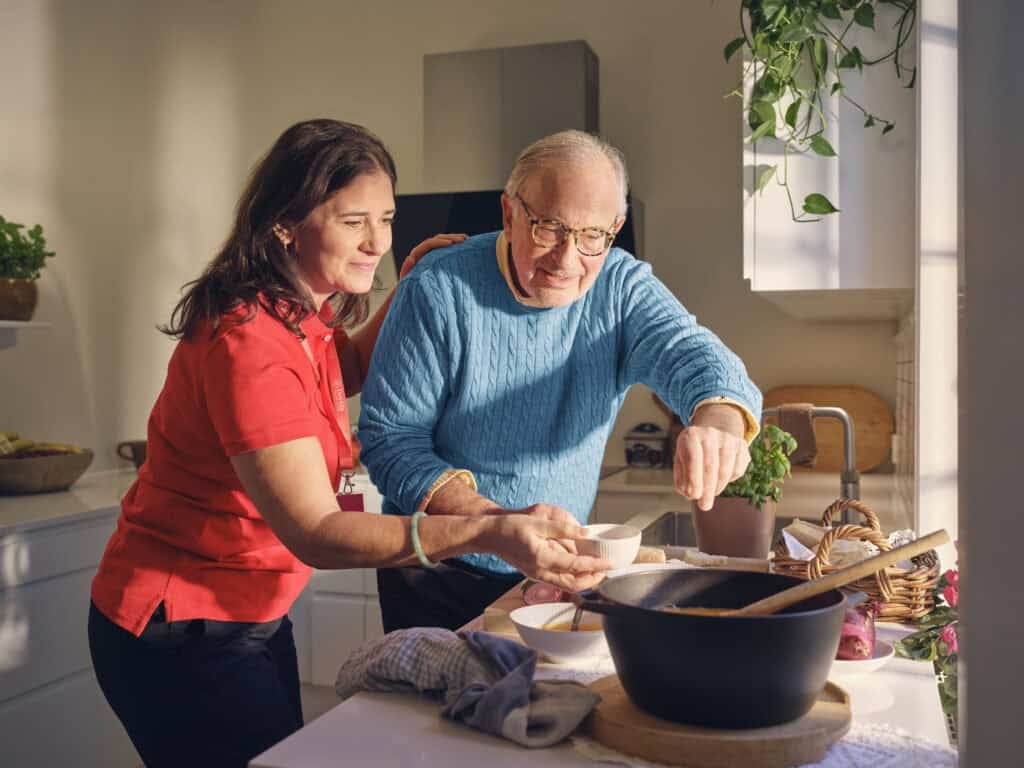Blog
17 June 2025
How Carers Can Reduce Stress
Caring for a loved one is one of life’s most meaningful experiences, but it can also be physically, mentally, and emotionally demanding. Many carers find themselves so focused on providing excellent care that they neglect their own wellbeing, leading to stress, exhaustion, and burnout.
Prioritising self-care isn’t selfish – it’s essential. When carers maintain their own health and wellbeing, they’re better equipped to provide quality support to their loved ones. Here are some effective strategies to help reduce stress and promote overall wellness while caring for someone you love.
Seek Support and Connection
One of the most important steps carers can take is reaching out for help and support. Caring can feel isolating, but you’re not alone in this journey.
Building Your Support Network:
- Join local carer support groups where you can connect with others in similar situations
- Explore online communities and forums for 24/7 peer support
- Share experiences, advice, and concerns with people who truly understand your challenges
- Consider professional counselling or therapy for additional coping strategies and emotional support
These connections provide more than just practical advice – they offer validation, understanding, and the reassurance that your feelings and experiences are normal parts of the caring journey.
Establish Clear Boundaries
Setting healthy boundaries is crucial for maintaining balance between caregiving responsibilities and your personal life. This isn’t about caring less – it’s about caring sustainably.
Creating Healthy Limits:
- Recognise the warning signs of feeling overwhelmed or approaching burnout
- Communicate openly with family members and friends about your needs and limitations
- Ask for help with specific tasks rather than trying to handle everything alone
- Schedule regular personal time for relaxation, hobbies, and social activities
- Learn to say “no” to additional responsibilities when you’re already stretched thin
Remember, taking breaks doesn’t make you a bad carer – it makes you a sustainable one.
Practice Meaningful Self-Care
Self-care often gets pushed aside when caring for others, but it’s fundamental to your ability to provide ongoing support. Effective self-care encompasses physical, mental, and emotional wellbeing.
Essential Self-Care Practices:
- Engage in stress-reduction activities like meditation, yoga, or deep breathing exercises
- Maintain regular exercise routines, even if it’s just a daily walk
- Prioritise sufficient sleep and establish healthy sleep routines
- Eat nutritious meals and stay hydrated throughout the day
- Continue pursuing hobbies and activities that bring you joy and fulfilment
- Maintain social connections outside of your caring responsibilities
These practices aren’t luxuries – they’re necessities that help you maintain the energy and emotional resilience needed for quality caregiving.
Utilise Professional Respite Care
Respite care provides temporary relief by transferring caregiving responsibilities to trusted professionals or family members. This break allows you to recharge, rest, and attend to your personal needs without worry.
Respite Care Options:
- Professional home care services like Dovida for a few hours or several days
- Adult day care programs that provide social interaction and activities
- Overnight or extended care for longer breaks
- Family and friend support networks for shorter respites
Dovida’s respite care services are designed to provide peace of mind, knowing your loved one receives the same quality, person-centred care you strive to provide. These breaks aren’t just beneficial for you – they can also provide your loved one with new social interactions and experiences.
Stay Informed and Educated
Knowledge empowers you to navigate caregiving challenges more effectively and with greater confidence. Understanding your loved one’s condition helps reduce anxiety and improves your ability to provide appropriate care.
Ways to Stay Informed:
- Attend educational workshops and seminars about relevant health conditions
- Seek information from reputable medical sources and healthcare professionals
- Learn about available community support services and resources
- Understand potential symptoms and progression of your loved one’s condition
- Stay updated on new treatments, technologies, and care approaches
This knowledge helps you make informed decisions, anticipate needs, and feel more confident in your caregiving abilities.
Finding Balance in Your Caring Journey
Caring for a loved one is demanding, but it doesn’t have to be overwhelming. By implementing these strategies consistently, you can reduce stress while maintaining the quality care your loved one deserves.
Remember that taking care of yourself isn’t taking away from your loved one – it’s ensuring you can continue providing excellent care for the long term. When you’re physically healthy, emotionally balanced, and mentally clear, you’re able to be fully present and engaged in your caring role.
Your wellbeing matters. By prioritising it alongside your loved one’s care, you’re creating a sustainable approach that benefits everyone involved in the caring relationship.

